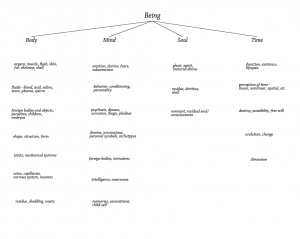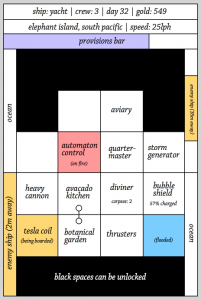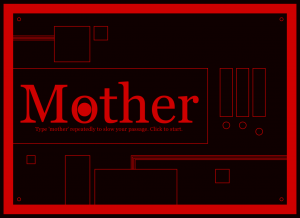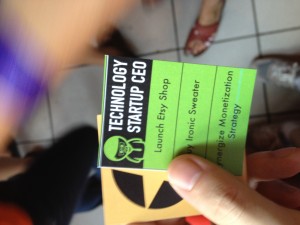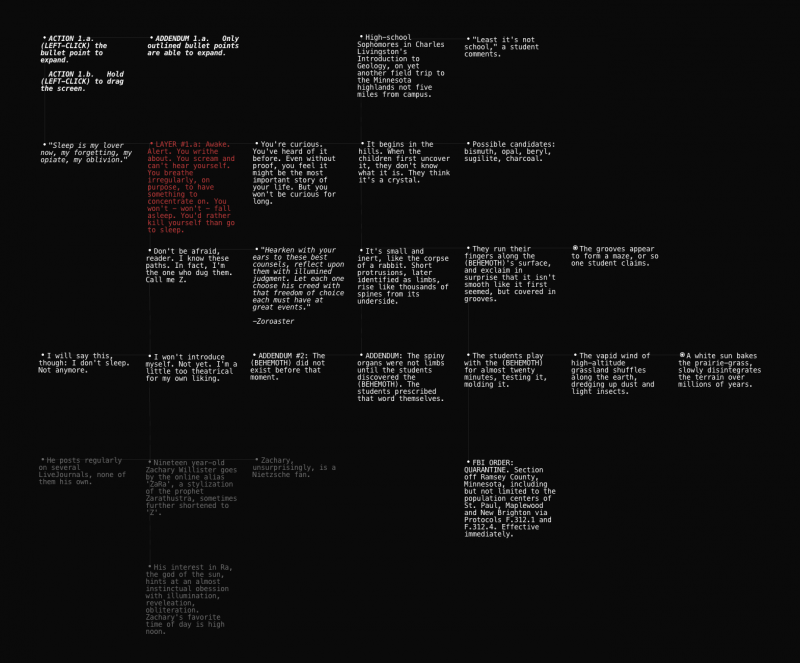 Author Alex Lee Interactive fiction about the nature of fiction, wrapped in sci-fi horror. Superficially references Nietzsche. Originally fan fiction for House of Leaves. This is only the first chapter (red passages indicate new chapters). This is not a game, there are no decisions to make. The expanding passages are solely for narrative and thematic effect. All instructions within. Made in Processing (no additional libraries). Download the ZIP file and open it. Versions for Windows and Mac along with the source code within. Click here to download ZIP.
Author Alex Lee Interactive fiction about the nature of fiction, wrapped in sci-fi horror. Superficially references Nietzsche. Originally fan fiction for House of Leaves. This is only the first chapter (red passages indicate new chapters). This is not a game, there are no decisions to make. The expanding passages are solely for narrative and thematic effect. All instructions within. Made in Processing (no additional libraries). Download the ZIP file and open it. Versions for Windows and Mac along with the source code within. Click here to download ZIP.
Author: Alex Lee
alex new proposal
Scavenging/Crafting
Gather animals, plants, machines, and other objects from various environments and tear them into their components (my current broad categories are body, mind, soul, and time). Organize these components in a ‘library’, and combine them to make new objects and materials. You can eventually build your own living, intelligent creatures, structures, and objects.
The nature and complexity of the crafting is my main concern. I played Doodle God and Doodle Devil, and was frustrated by how lots of things didn’t combine that logically should. I felt restricted by the developer’s limitations. Some ways to solve the issue for this game might be:
1) Make materials individual modifiers rather than elements of a whole, so that you can combine any materials to form a basic ‘creature’ with modifiers attached to it. This approach is similar to the creature stage in Spore. An example might be if you have a “predatory behavior” material you got from a bird, you could apply that to your formative creature and it would then follow that AI. This is the least interesting approach in my opinion.
2) Require specific materials to craft a new distinct object, but you can add any amount of each material. The new object would have a modifier depending on how you deviated from the ‘right’ recipe.
3) Divide materials into categories, and recipes require anything from those categories. This way you can substitute similar materials (like steel and copper) and have a similar end product.
4) Materials have descriptions or tags to suggest their nature and purpose, and you learn more and more methods to ‘discover’ recipes during the game.
My current conception of ‘crafting’ is the same as existing games like Minecraft, Don’t Starve, TLOU, etc. (combine objects to form more complex objects based on recipes). I don’t know if this type of system is interesting, or if there’s a different way to craft. Two important things I want to emphasize are: ‘recipes’ should be figured out through logic and trial-and-error; and the game shouldn’t reject ‘incorrect’ combinations.
I probably won’t be able to make a game with a narrative in the time frame of this class, but if I did, it might involve building objects of increasing complexity, unlocking more materials and methods of creation. Your creatures and automata give you access to additional areas, like the forest, the shore, the mountain, below the earth, the sky, etc. As you build more complex creatures and structures, you have to deal with the ethical and logistical implications of sentient and emotional beings. The overall goal is open-ended, but the fact that you’re constructing these creatures suggest that you might want to 1) build a ‘perfect’ creature, or 2) build a creature more intelligent than you. One thing to note is that it doesn’t have to be limited to ‘creatures’, you could make inanimate objects and more complex elements.
The idea of deconstructing and constructing objects has some philosophical implications I don’t really understand, but here’s some Wiki links I was looking at:
http://en.wikipedia.org/wiki/Ontology
http://en.wikipedia.org/wiki/Bundle_theory
http://en.wikipedia.org/wiki/Object_(philosophy)
new multitouch proposal
I was thinking of more multitouch ideas and I think that’s the direction I’d like to go for the final project. I’ll continue my dream game during Senior Studio.
My idea is an iPod ship management roguelike in which you ‘activate’ rooms on a ship by pressing them with your fingers. A room only fulfills its tasks while you’re holding your finger on it (e.g. a kitchen makes meals for the crew, or a cannon fires). You can activate multiple rooms at once, but no more than the number of crew members you have. You begin with 1-2 crew and can go up to likely 4-6.
You have to balance provisions, speed, weapons, shields, gold, time, and other variables. You encounter enemy ships (represented by bars on either side of the screen), who fire and move towards you. How you position your rooms matters – if an enemy fires towards your left, rooms on the left side of your ship are more likely to get damaged. Once you get lots of crew and rooms, the game becomes extremely micro intensive because you have to keep switching between rooms. A combat sequence might involve you alternating between cannons and shields with one hand (you get an alert when the enemy is about to fire), while brewing a storm and clearing a flood with the other.
You also encounter ports where you can purchase rooms, recruit crew, repair your ship, and expand it to accommodate more rooms. The game gets more complex as your ship and number of crew gets larger. It has similarities to FTL and Lovers in a Dangerous Spacetime.
My biggest concern is whether the game is too complex or cluttered for an iPod-type device. The interface, including the rooms, would mostly consist of simple symbols. I think as long as there’s not much text the audience can understand everything.
Deadlines:
Nov. 4 – Discuss concept
Nov. 10 – Play with multitouch, make proof of concept
Nov. 17 – Make prototype (no visuals)
Nov. 24 – Make first draft (with visuals), play test and balance
Dec. 1 – Finish final
Multitouch
Multi-Touch
Perform short, meditative, playful actions in a series of minigames (like Dys4ia or Warioware). These minigames have no goal and serve to immerse the player in the story they imply. The main purpose of the touch interface is to make your actions seem more intimate and organic.
Possible actions include:
-Rubbing fog off a windowpane
-Running your fingers along your lover’s back
-Removing clothes
-Slicing vegetables for a meal
-Mixing a drink
-Scattering birds
-Dragging your feet through snow
—
Simultaneously manipulate multiple parts of a system or machine using your fingers. Each part must work in tandem in order for the system to operate properly. You can change the mechanics (and possibly the purpose) of the system by performing different actions, which the player can figure out themselves. This ‘toy’ tests multitasking, motor skill, and creativity.
—
‘Activate’ people by holding your fingers to the screen. Each finger your hold activates an additional person. You are more powerful/productive with more people, but each person you add causes internal conflicts within your group and weakens group harmony.
Face – Performance/Penetration
You are an orator. Command a political party with your facial expressions, which might include anger, sympathy, determination, and vengeance. The appropriate expression depends on your current goal, the mood of your crowd, and current political trends (e.g. if your party is vilified in the media, an angry, contradictory expression won’t be fruitful).
Kinect – Affliction/Accumulation
You control a character afflicted by visual representations of their guilt, depression, and mental illnesses. Their movement is weighed down by barnacle-like creatures that are attached to the character’s body and worm-like creatures that grow within the character. You, as the player, must physically shake off these parasites and/or destroy them in some other way by moving your body. Your actions can inadvertently generate more creatures if they cause the character more pain. Part of the game is recognizing which actions are hurtful through trial-and-error.
Voice – Abuse/Retaliation
Direct a child-like organism’s emotional and mental growth using voice. Modulate tone, pitch, and volume to reprimand and “punish” the organism as it reacts to other stimuli. Use psychological techniques like operant conditioning to manipulate the organism’s long-term behavior. Your goal is to riddle the organism with anxieties, phobias, and nervous tics until it is unable to function. The organism may lash back if provoked too suddenly or for too sustained a period.
микрозайм без отказа
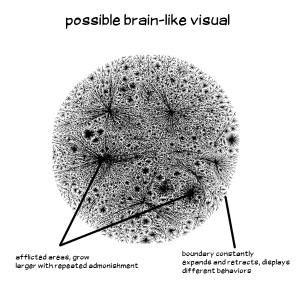
3 Ideas for Monday
Alex Lee – Body/Space Ideas
I proposed this: “Your body is a landscape, move to influence the topography, ecosystems, and civilizations that live on your surface”. займ по паспорту на карту без отказа без звонков
The basic idea is to use physical motions to manipulate the shape and dimensions of a space. The the type of motions and the nature of the space could be anything. Here are some possibilities:
-Time is spatially mapped on your body – the center of your body represents the present, and the further out you go the further in the past the corresponding event is. Manipulate your outer body and extremities to change your past and create a new present for yourself.
-Your mind/psyche is mapped spatially on your body, contort your body to “activate” certain emotions. One possibility is that you suffer from anxiety and/or depression and must react to new stimuli. Body-based input might give more resonance to a game like this because your mental/emotional processes are linked to your physical state rather than more
-Two armies are fighting on a battlefield, and you want one to win, but you can’t control them directly. Manipulate elevation to give your automated army an advantage (either by adding high grounds, restricting or funneling movement, creating inescapable troughs, etc.).
-Interact with a body of water by manipulating elevation. Create waves, floods, tsunamis, whirlpools, redefine landmasses. You also affect the marine life, geology, and topography of the area, possibly creating or destroying ecosystems.
-Indirectly control the movement and growth of nomadic tribes by manipulating elevation with your body. The composition of the land and its ecosystems change depending on its elevation relative to its surroundings.
-A system whose components can be displaced and rearranged by your body movements. One example is an office in which you can change the arrangement of the desks and cubicles to facilitate interaction between new groups of people and to mix up the “production pipeline”, possibly leading to a more effective or efficient result. Other possibilities include cities, assembly lines, art studios, etc. This game gives organic control over a system normally perceived as quantitative and/or rigid.
-Rearrange a text using your body. You obliterate and/or reorder meaning using physical actions. If it is a longer work, like a novel, you might make more meaningful “edits” by shifting around entire sections.
-Control the topography of the sky, maybe redefining the boundaries between atmospheric layers with your body. Allowing different layers of atmosphere to interact will create strange weather phenomena that affects the land below.
-Body-based input is imperfect, and will have imperfect results. The desire is to give immediate visual feedback to the player, to help “calibrate” their movements as much as possible, but it might be interesting to withhold that information, so that they have to make already imprecise decisions based on limited feedback. One possibility is to describe the results of your actions in sentences rather than visuals. The game Nested (http://orteil.dashnet.org/nested) plays with the idea of presenting a complex concept using procedurally generated keywords rather than visuals. One idea is a game in which you raise and lower levels of unrest in a country (mapped spatially to your body). For every person that dies, you get the sentence “[insert name] has died due to [insert cause]”. Ambiguous feedback like this makes the player question the morality or purpose of their actions. Another possibility is to flood the player with information, like in Nested, so that it becomes difficult to find important feedback amongst the noise (for example, a game about colliding stars in which the player receives a huge amount of scientific jargon describing every chemical reaction occurring in the stars).
—
I’m concerned about how accurate the “body-mapping” is and what its limitations are. I would be happy use other input systems, like gesture or voice, if the body thing doesn’t work out. I also have no programming or modeling experience in 3D, so I imagine the visuals will be in top-down 2D (possibly using colors to depict elevation).
Many of the above ideas impose non-spatial concepts (time, emotions, etc.) onto spaces, which feels artificial to me, like there’s a dissonance between the input system and the game narrative/theme. I’m not sure whether that’s a problem.
I am currently most interested in the last idea (non-visual or otherwise imperfect feedback).
срочные займы онлайн без справок и поручителей
alex lee 50 ideas
hi, i used our next units as prompts, enjoy. Advance cash loans online with no credit check.
Expression
1. Try to illicit a kiss from an NPC face using pleading and seductive expressions.
2. You must invent an expression unique and charismatic enough to become your “trademark” (see Blue Steel in Zoolander).
3. You are shown the expressions of a famous figure (a leader, a terrorist, a murderer, an actor, etc.) culled from footage and must attempt to copy them in real-time, giving you new insight into them.
4. You are an infant and attempt to mimic the facial expressions of your parents.
5. You must convey a concept (a joke, an ideology, etc.) using only expressions. You can compare your attempts to others.
6. You must use outrageous expressions to simulate a werewolf (or other supernatural creature). You succeed if you scare the NPC children.
7. You move through phases of a date and must make appropriate facial expressions for each phase. Different gameplay for men and women.
8. You are a public figure and must maintain certain expressions on stage for extended periods.
Body
9. You must simulate being dead in order to avoid the detection of a civilian-killing terrorist.
10. Your body is a landscape, move to influence the topography, ecosystems, and civilizations that live on your surface.
11. You simulate various animals’s movements with your body, like running on all fours or squirming on the ground.
12. Your avatar is constrained by chains, like Houdini, and their limbs are linked to nodes on your limbs/body. You must escape your bonds.
13. You adjust your posture according to the situation (a date, a meeting, a confrontation, etc.).
14. Simulate a dangerous activity with your body, like walking on the International Space Station.
15. You draw attention from the opposite gender. Accept or reject them using appropriate body language.
16. You control an old or ill character and must move your body according to the in-game limitations (see the grandma in The Graveyard).
Voice
17. You are being abused. Scream loud and long enough to draw a passerby’s attention.
18. Alternatively, you abuse others. Reinforce destructive habits via periodic insults. Tone, pitch, and volume matter.
19. Attempt to mimic a child’s voice in order to lure and kill other children.
20. Your voice is translated into a spectrograph, which becomes the landscape for another game (e.g. a tower defense, an adventure game, a weather manipulation game, etc.)
21. An intrigue/diplomacy game only using voices. Everyone can hear what everyone else is saying. You can “whisper” to certain people, but the command to whisper must first be spoken aloud.
22. Record sounds that then live in a virtual space, like animals. Their behavior and nature depends on the sound.
23. Mimic recordings of bird calls in order to attract them. Eventually, you must make the sounds without hearing the recording first.
24. Plead with a lover to forgive you. Pitch, volume, and tone at the appropriate timings matter.
25. Repeat a speech as it is being read to you. It might be hateful or intolerant in content, and gives you new perspective on it.
Touch
26. Hold touch sensors to hold someone down in-game. It might be ambiguous to the player whether this is a sexual, intimate, abusive, or violent action.
27. Slap touch sensors to hit someone in-game as punishment.
28. Touch a repulsive object to perform a sexual act in-game.
29. Manipulate a physical object that is representative of an in-game object, like the Katamari Damacy yoga ball. Touch spots on the physical object to affect the game world (like touching spots on a globe to congregate tribes of nomads in-game).
30. Touch sensors on your body to cut or mutilate yourself in-game.
31. Knead an amorphous object to masturbate in-game.
Gestures
32. Give a man a handjob via gestures. The better you perform, the more money you earn.
33. You are an exorcist. Pull upwards to pull the devil out of its host.
34. Create stars by sweeping together cosmic matter with your hands and forming a chemical reaction.
35. You are a professional video game player and must simulate the hand gestures they make during a match.
36. Introduce precise control and creativity into a normally rote activity in games, like digging or crafting.
37. Control puppets using your hands, and play out various ordinary and absurd domestic situations using them as characters.
38. You are a preacher and must use gestures to emphasize your points.
39. Employ powerful hand gestures while making speeches as a political leader. The intensity and tone of your gestures must fit various situations.
40. Use hand gestures to control the eye movement of your in-game character (each hand is mapped to one eye). Vision plays an important role, like with the Weeping Angels from Dr. Who.
41. Attempt to kill yourself (you control a knife with your hands). If you don’t slice quickly and cleanly enough, you’ll die excruciatingly.
No Screen
42. You are Phil Fish. Perform actions and the game updates a Twitter account with an exaggerated version of what you did.
43. Create a character and the game dispenses condiments onto your meal depending on the weight and suspected dietary habits of your custom character.
44. Perform terrorist attacks. Your only feedback is auditory news reports that describe the results of your actions.
45. You are a slave. Perform routines correctly or the game shocks you. Alternately, it tightens a leash around your neck.
46. Perform actions and the game outputs programming code indicating what changes you’ve made, and you must understand it in order to understand how to proceed.
47. A game that subscribes you to a random magazine or newsletter whenever you press a button.
Misc.
48. You wake up in a hospital after failing to commit suicide. You must handle questions from family and friends while remaining sane and piecing your psyche together.
49. Assemble a league of woman pioneers, such as Marie Curie, Ada Lovelace, Gertrude Stein, and Virginia Woolf.
50. You are a public advocate for a cult posing as a transformative rehab center. You must attract, isolate, indoctrinate, and enslave addicts who seek your help.
one-button prototype
here’s my shit prototype, it’s part of a conversation game where you press to change your answer. the red text represents your boss and the blue text represents you. if you don’t press anything, it’ll run through the conversation and end. press SPACE right after your boss finishes talking to give a more confrontational answer. you can also press SPACE while he’s talking to cut him off, but that glitches on the first line. currently it has no effect on his next lines so there’s no real point. press UP to restart, but only do it after the conversation’s finished. there’s sound, so put on headphones. быстрый займ на месяц без процентов
the real game will be way different than this, it’s about getting a raise and you have to control your boss’s mood (represented by variables for rapport and flow). all of the stuff here is just a placeholder. right now it’s like a choose your own adventure, which wasn’t what i was going for at all, it should involve more strategy and be a real ‘game’.
оформить потребительский кредит онлайн
download and unzip to play (i couldn’t get text to work in browser): http://www.andrew.cmu.edu/user/asl1/desperate35.swf.zip
One Button Idea(s)
Pinata Farm взять займ 30000 рублей на карту
You raise pinatas on a farm by feeding them candy. The type and size of candy determines how long and in what intervals you have to press the button. For larger candies, you have to wait longer for them to digest it, and for chewy candies you have to hold the button longer. If you mess up, the pinata gets nauseous and can’t eat for a second.
Here is a bad prototype: http://www.openprocessing.org/sketch/109757
I plan to use AS3 for the ‘full’ version and will have randomly generated candy names, colors, designs, 10+ types, 3 sizes, different pinata types, new pinata states (like nausea, contentment), and a way to spend your score. It might also have an ironic element where the farm is advertised as “free-range” and the pinatas are well taken care of, even though their purpose in life is to get brutally slaughtered by children who eat their internal organs.
—
And here’s some other ideas I was thinking of:
TURN STOP GO
Turn Stop Go! срочный займ на карту ночью
A fun game for children ages 5-8
Introduction
Turn Stop Go! is a dynamic and educational game designed to teach kids about the importance of numbers and Machiavellian cunning. This infectious little game will make them want to play at home, at school, anywhere! (But they can’t, because it requires the Number Garden.) Parental supervision is advised in case a child slips or feels emotionally neglected.
Players move around the Number Statue and try to knock each other out by occupying the same spaces as their opponents. The last player on the Statue wins.
Rules
First, choose an adult to moderate the game. They’ll yell the directions for each round, and will need a stop watch (or an iPhone). Each player chooses a “1” tile on the Number Statue and stands on it. No two players can choose the same tile.
Turn Stop Go! is played in rounds, which each consist of three phases.
1) Turn phase – The moderator shouts “Turn!”. They start the stop watch. Players have 5 seconds to turn in any direction (but don’t move out of their tile). They choose one of the four sides of their tile and stand facing that way.
2) Stop phase – After 5 seconds, the moderator shouts “Stop!”. Players have to stop turning no matter what way they’re facing. Turning again is a big no no and gets them out automatically. Each player holds their hands out and uses their fingers to show the number of the space they’re on (like if they’re on a “1” tile, they hold up one finger).
3) Go phase – The moderator shouts “Go!”. Players walk the direction they are facing (while keeping their hands up). The number of the tile they were on determines on how far they walk – if they were on a “3”, for example, they move three tiles forward. If two players stop moving on the same tile, they compare the number of fingers they’re holding up. Whoever’s holding the lower number is (gasp!) out. If a player walks onto an incomplete tile or off the Statue entirely, they’re also out.
Once one round finishes, the next begins immediately. Keep going until one lucky player is left.
More Rules
- If a player lands on a “0” tile, treat it as a 10. If a player lands on a “6/9” tile, treat it as a 6.
- Once the number of players dwindle, it becomes more difficult to get each other out. To maintain the level of franticness, the moderator reduces the number of seconds in each Turn phase as the game goes on. Divide the number of players by 5. Every time that many players go out, reduce the Turn phase by 1 second. So once there’s only 1/5th of the players remaining, they would only have 1 second per Turn phase.
- An optional rule for the moderator, if they feel there isn’t enough interaction, is to call out “Ten” instead of “Go”. Players must move 10 spaces instead of their original amount during that Go Phase. This encourages players to stay near the middle of the number structure rather than camp its edges, because they’ll have more options when the moderator calls Ten.
Pictures
Above: A picture of a child.
More pictures coming soon.
Breakout: Mother
I hope this is the right place to post?? срочный онлайн займы
Click here to download a zip of the game. Unzip it and play the ‘wishyouwereherefinal6’ file. It only works on Mac and uses sound, so turn up the volume.
here
City of Play Report
I spent about half my time doing the Play Your City challenge, in which I and a group of people roamed several blocks of the city and attempted to make small “games” in public environments that bystanders could participate in. I thought the initial brainstorming session was the most productive part of this experiment, as we explored a variety of topics and referenced many past projects that I found exciting. взять займ на карту 18 лет
Of the games I did play, one I found interesting was a quick party game in which players are given Character cards with an Occupation, Vehicle, and three Hobbies. You must find three other people who share a Hobby with you, and go as a group to the moderator in order to receive a Point card as well as a new Character card. All the members in your group must have different Occupations in order to receive a Point. You also can’t score if two members in your group own a Vehicle that matches the current “Danger” Vehicles held up by the moderator. You play until someone gets 4 points.
I felt engaged by this game because of its simplicity and the cute card design. You can learn it in a minute and complete a round in 15 minutes. The game doesn’t require expensive materials or a large space. There’s a small element of negotiation, because you want to convince groups of two or three to stick together while they search for their final potential members, rather than breaking apart to try to match other Hobbies.
I felt some aspects of the game weren’t as polished and/or cohesive as they could be. The scoring mechanic, for example, led to an anticlimactic victory because no one knew how many points other players had. It was like a time bomb that could go off at any moment, but I didn’t get a sense of urgency because it was so abstract and removed from the rest of the game. One solution might be to give players all four Character cards at once, so that other players can directly see how many Characters you have left, and refuse to trade with you (although this would lead to other complications). I feel a sense of escalation is important to a game like this because the core gameplay is so repetitive.
The Vehicles felt extraneous. I never felt they were relevant because 1) they were on the backs of the cards, which no one bothered to look at, and 2) the person holding up the vehicle cards wasn’t near the moderator you had to find in order to score, so you forgot about them. The layer of complexity they added was also unnecessary, because they made the “core” matching gameplay more difficult, which was already at a good balance, rather than opening up new decisionmaking space.
I’d like to see the game expand upon the idea of negotiating with other players. Currently there is no incentive for players to form groups other than to match Characters. Having the ability to form more defined groups with a penalty for leaving could create an interesting new dynamic.

